Faint Signs of Faith Part 6: Czech Quandaries And An Endless Quest For Answers
PRAGUE — Everything on the 15th century medieval-Gothic pedestrian bridge that connects the Old Town of Prague to the Lesser Town is art.
One flock of tourists and passersby enters, and the other leaves — then comes another. People stop by to click pictures or look at handmade crafts to take back home — as souvenirs for themselves or gifts for family and friends. This time, however, people, myself included, stopped almost as a result of a pull that was music.
The music reminded me of the love I will never have. I could imagine his — the long lost love’s — face, as I listened to the music being played. I cried, “Oh! thine cruelty,” as I listened. And I looked down just to hold back my tears. It was melancholy; and it was magic.
Ondrej Glogar, a young man from Moravia, Czech Republic, is often seen playing the handpan and the Aboriginal musical instrument the didgeridoo, among other musical instruments, at the Charles Bridge.
“My god is my music,” he said when I asked him what God meant for him. And why did I ask him this? I was out on the streets of Prague to talk to people about their religious thoughts and beliefs as part of my journalism assignment.
“Music makes me happy and euphoric; it’s constantly giving me something and asking nothing in return. It inspires dreams in me. And that’s my god.”
Ondrej was born in a family of Roman Catholics. But he’s not a religious person and doesn’t believe in the church. He believes that Czech Republic is a country of atheists.
“My idea of God is different. I do not believe that these statues are a part of my religion,” he confessed, pointing towards the intricate Baroque statues of Catholic saints that stand on the sides of Charles Bridge. “I believe in the soul. Life, for me, doesn’t end with death,” he added.
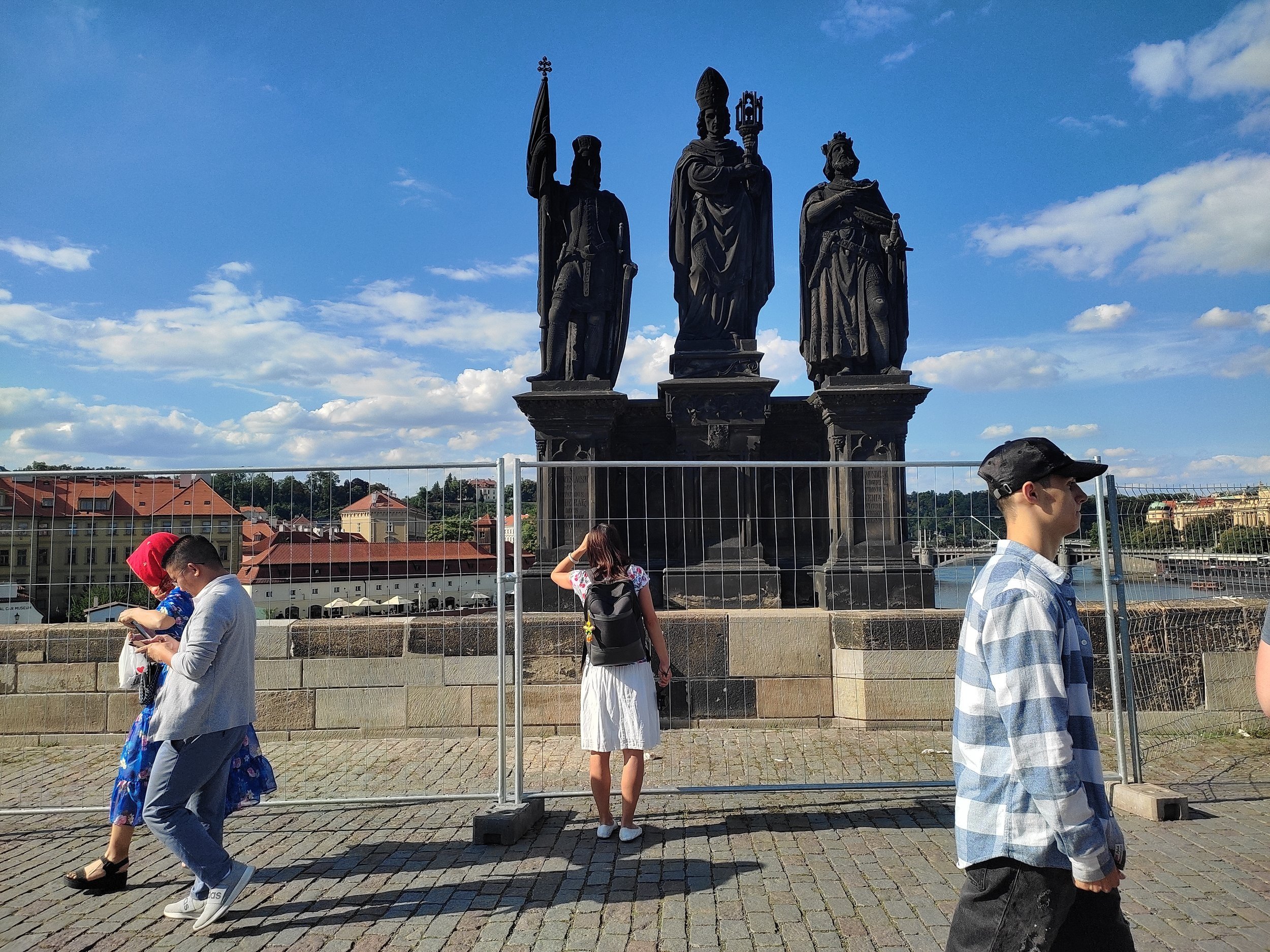
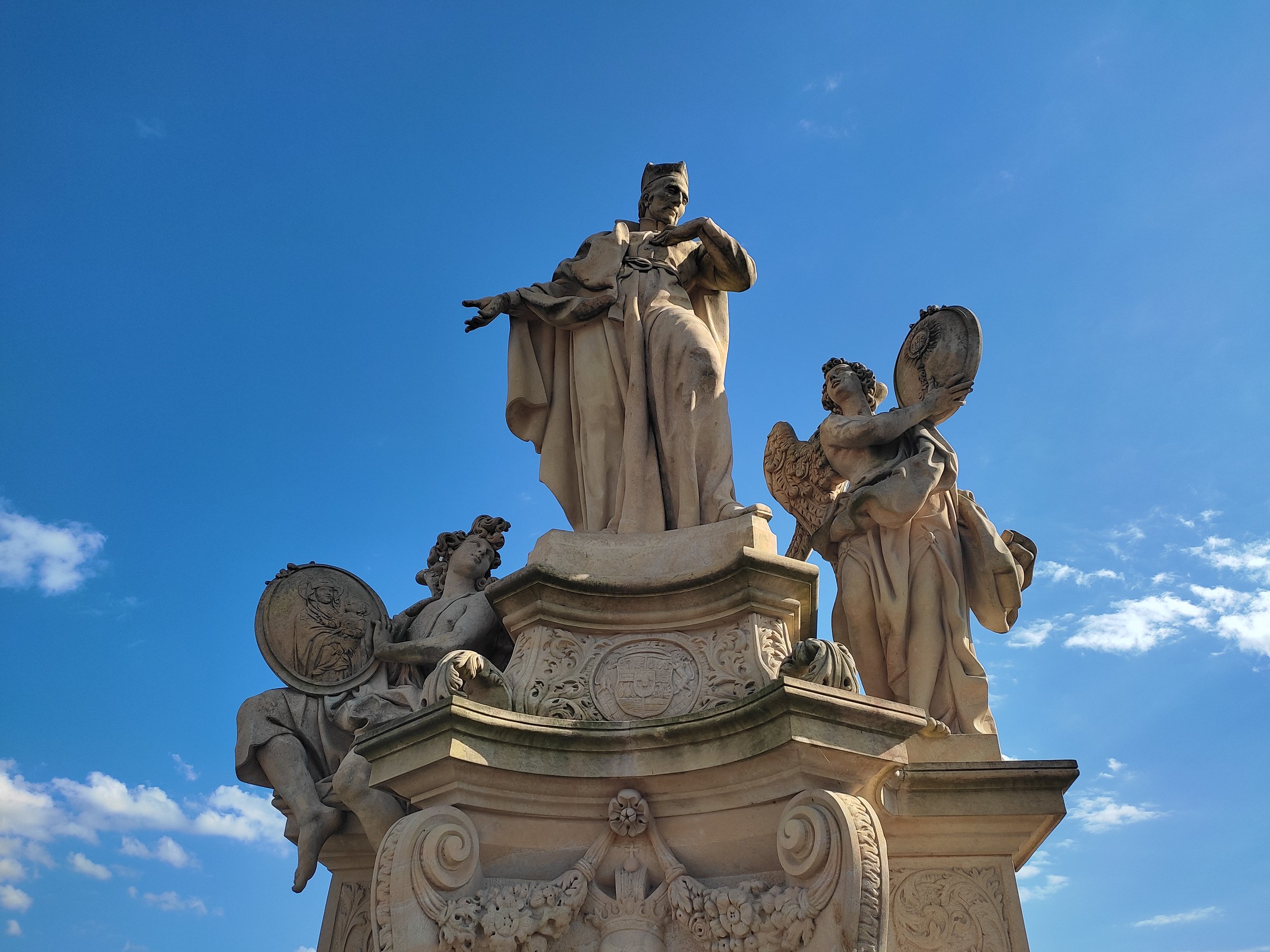
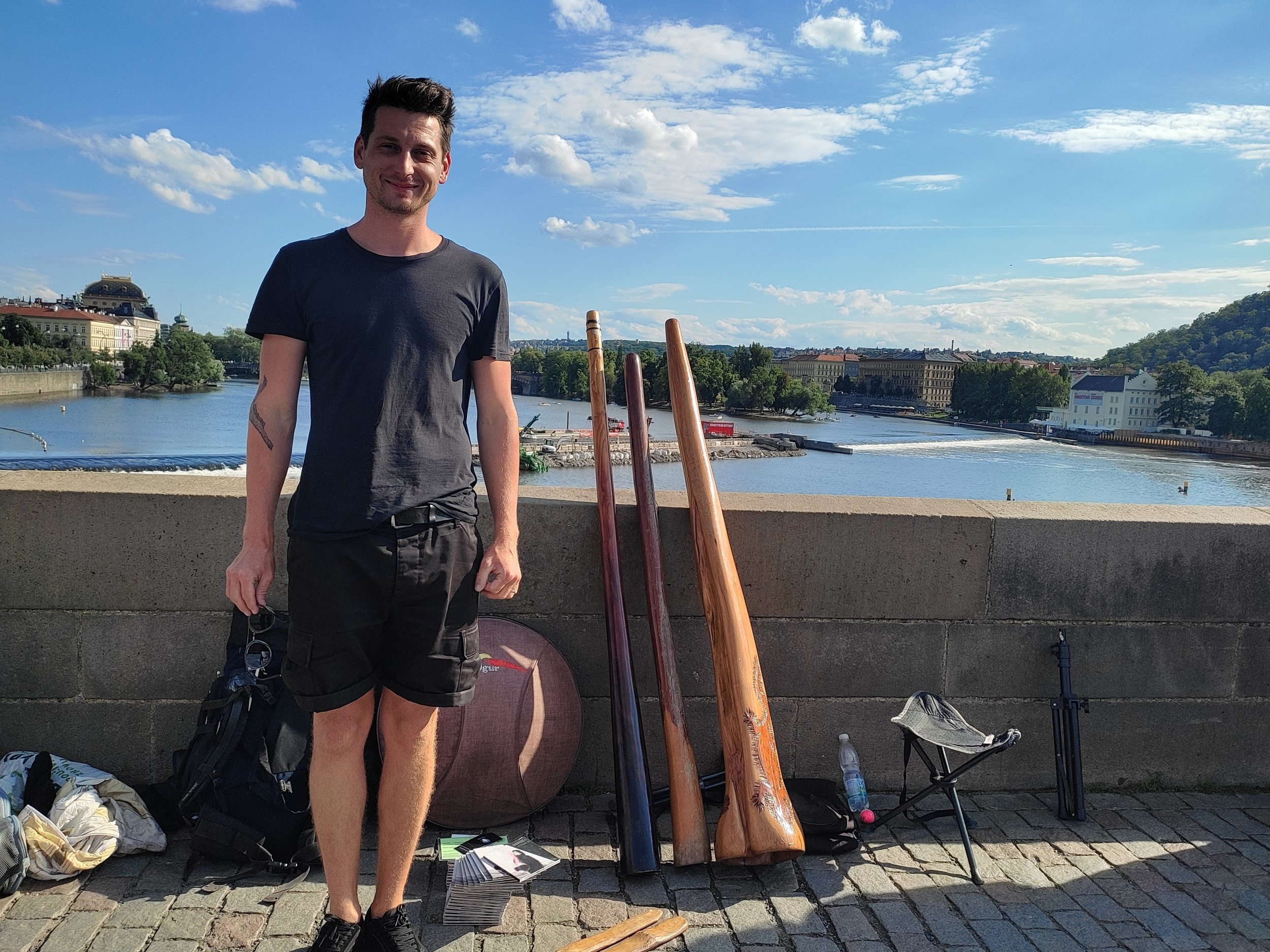
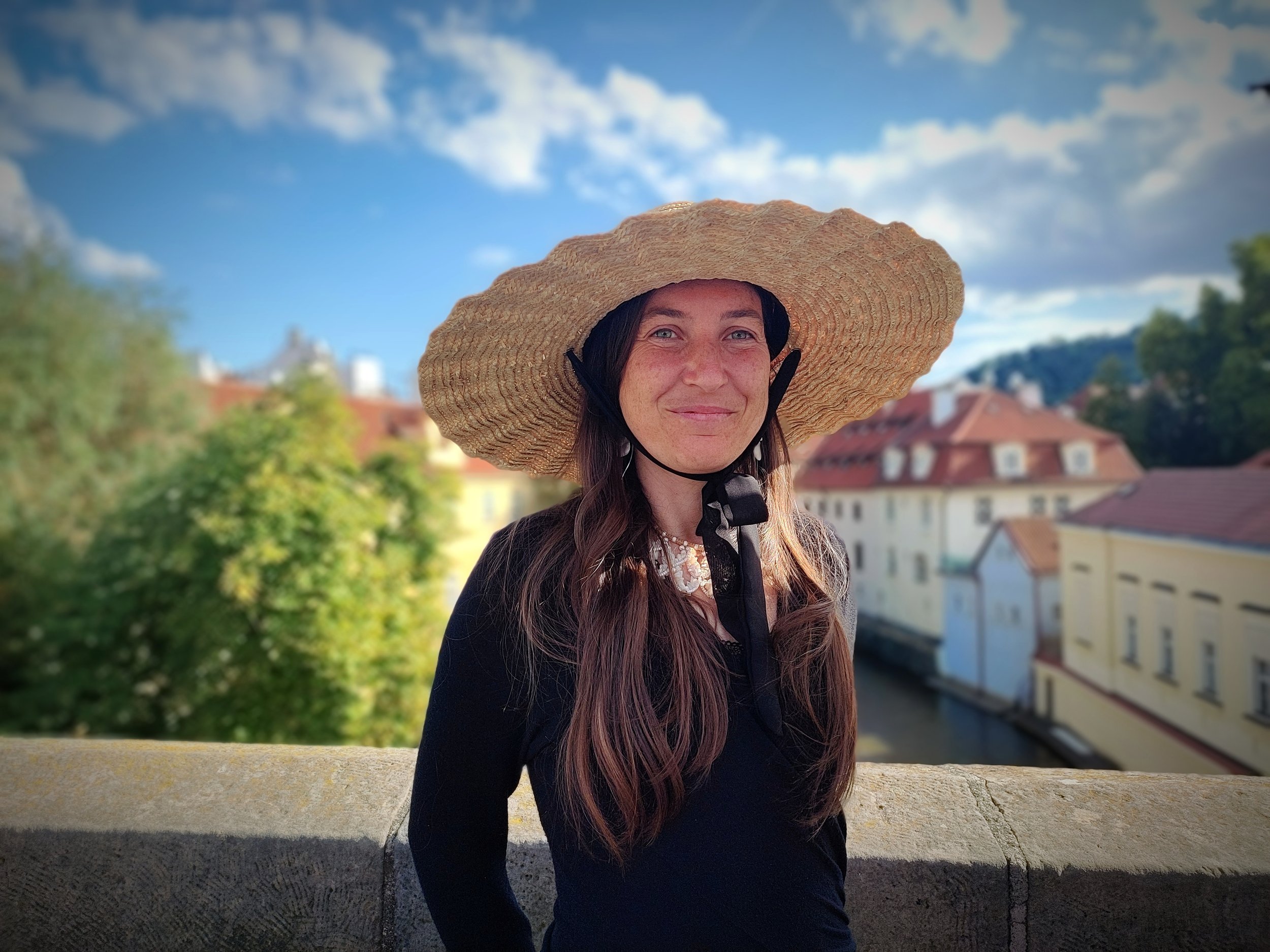
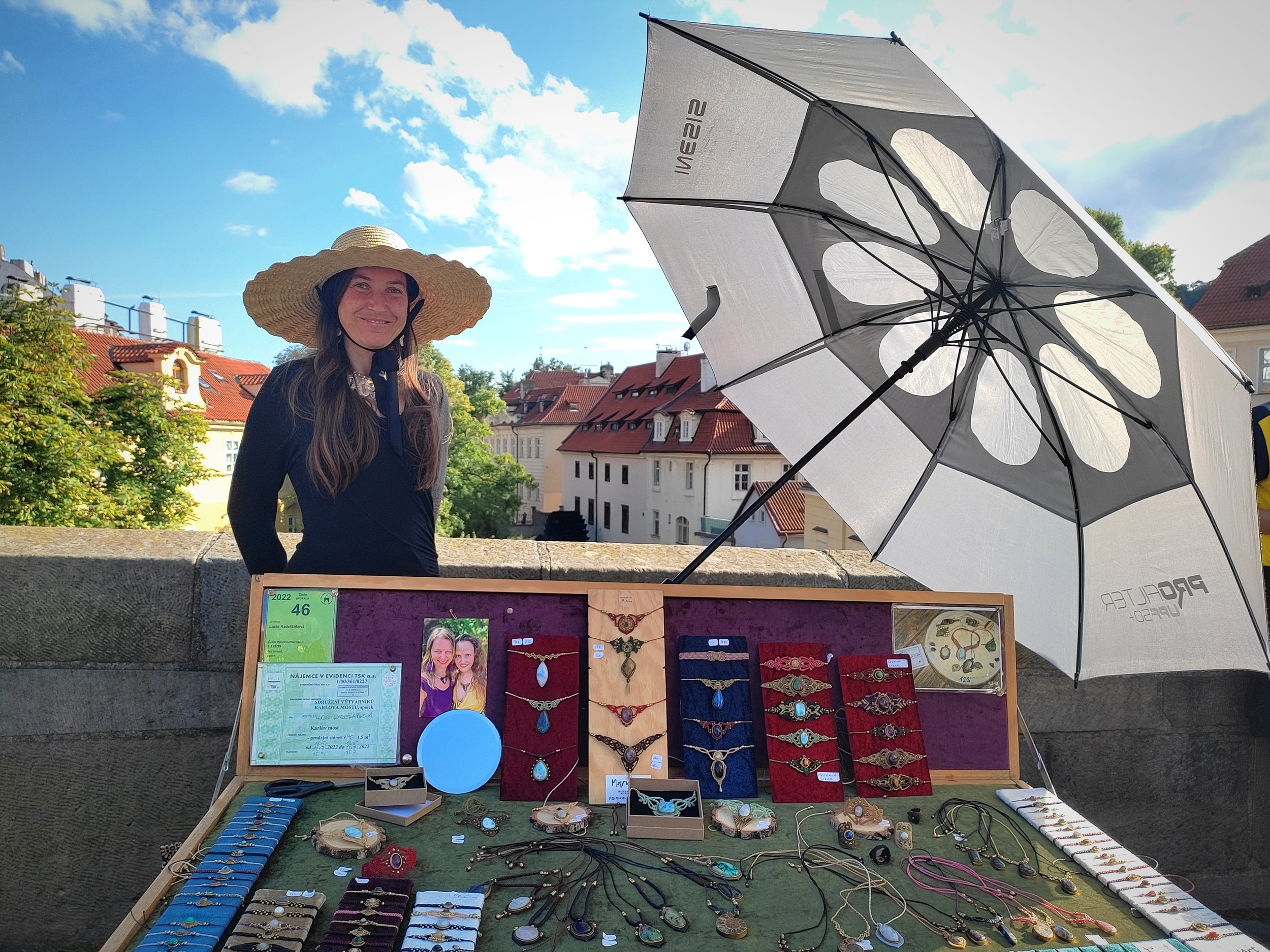
Photos of Czech people and tourists on the Charles Bridge. Photos by Surabhi Singh.
I wasn’t surprised by Ondrej’s idea of religion and God because I had just learned that a 2021 survey put the percentage of atheists in the Czech Republic at 48%. The STEM/Mark survey was conducted for the Christian group Maranatha. In the same survey, 32% of people said they were believers, and 20% refrained from giving an answer or said they were nothing. A similar survey conducted by the Pew Research Center in 2017 suggests that 7 out of 10 people in the Czech Republic do not identify with religious groups.
I moved ahead trying to find Czechs who could understand and speak the English language. I met Sylvie Knizetova, who was looking after a handmade jewelry stall on the Charles Bridge. She told me she was from Osek, a small town less than 100 kilometers (62 miles) from Prague.
“That’s where I was born, but I live here in Prague,” she told me.
I asked her if she was a religious person. “I am not religious, and I don't go to church.”
I wanted to know why.
“We were a communist nation once, and they (the Communist Party government) didn’t like the church. So, we became an atheist country. Secondly, we’ve heard scandals about the church, including about sexual assault of children. And it’s not just Czech Republic but everywhere,” she said. “I have no complaints with Jesus Christ and his teachings. His teachings of love and respect for our fellow beings are very valuable to me. But I have a problem with the church.”
The Czech Republic, earlier the Czechoslovak Socialist Republic Or Czechoslovakia, was under Communist rule from 1948 until the end of November 1989, when students and later people of all ages demanded freedom, inspired by the fall of the Berlin Wall. It was called the Velvet Revolution.
“We had no freedoms during the Communist regime. We weren’t allowed to travel to other countries, and people would face imprisonment if they spoke against the communists,” she said.
Interestingly enough, Sylvie is not entirely happy with the present form of governance — that is, capitalism — either.
“On the one hand, there are people who are very rich, and on the other hand you have people who have no money, no home.”
Daniel Raus, a journalist and radio presenter from Prague, once told us that Czechs don’t like organized forms of religion, and they don’t like organized forms of politics. He also told us that Czech atheism is a “something-ism” — an idea where people are seeking answers and believe that something spiritual exists but discard institutionalized forms of religion.
Daniel Raus, a former top editor and broadcaster at Czech Radio. Photo Credit: Paul Glader.
I asked Sylvie if she believed in God. “I experience God in my own ways. I think God is everywhere, and the highest manifestation of this idea, for me, is love,” she said.
-By Surabhi Singh, who works for Newsreel Asia in India and graduated from the Indian Institute of Mass Communication in New Delhi.
Vignette 2: Atheists still celebrate Christian food
Although the Czech Republic is the most atheist country in the world, people still practice religious traditions today. Simultaneously, many factors contribute to the change of religious food culture in the Czech Republic, like globalization, tourism and immigration.
More than 30% of the country identifies as agnostic or atheist. In fact, Czech society is proud to be atheist. On the other hand, there are still Christian traditions practiced to this day. Every Dec. 25, the Czech people celebrate and eat roasted duck. It’s even served in restaurants that are not officially Czech or owned by a Czech. Moreover, on Christmas Eve, the served food is carbs, potato salad and fish. Also, “svíčková na smetaně,” a meat dish, is eaten for celebration, birthdays or Sunday lunch. On Easter, it’s duck or chicken filled with a special filling called “nadivka” and served as Easter cake in the form of a baby lamb — called “velikonocni beranek.”
Religion and culture can be intertwined, and it’s sometimes hard to separate the two because they both have sets of behaviors and practices.
On Easter Sunday, according to Czech gastronomy, “the lamb is brought to the church with Easter cake, eggs, bread, and wine to be consecrated by a priest.”
Although the majority say they are agnostics or atheists, food is still celebrated to this day.
Furthermore, because of demand, capitalism, globalization and immigration, people started opening different businesses and integrating American and other cultures into their food and traditions. For example, some cakes in a cake story are Czech, placed next to other American and international non-Czech cakes.
When you walk around Prague, you’ll notice other foods from different cultures, like falafel, and the ones who serve it can be sometimes be Muslim women or men. In addition to that, “halal food” tourism is booming since many tourists coming from Muslim countries eat their traditional food.
The globalization of this era has opened many gates to integrating new food or adapting to a new culture.
The concept of religion in the Czech Republic has been changing due to several factors like immigration and globalization. Although many in the country celebrate traditional food, the society is also integrating other foods and traditions into its culture.
The essence is whether the existence of religion or not influences the way humans live and behave. Religious dynamics have been always changing in the country, and food is just a part of the big picture.
- By Ghid Muayad, a graduate of the American University of Iraq-Sulimaniyah. She was an Ambassador for Peace and intercultural dialogue with UNESCO in 2019.
Vignette 3: Christianity in Prague in two portraits
Once in three minutes, a shrill sound of trumpets is heard from the staircase of the Church of St. Francis of Assisi near Charles Bridge in Prague. The little square in front of the troubadours is full of tourists passing through the bridge. Despite having headphones and listening to a tour guide, few of them turn their head and come closer as they hear the familiar tune. Right next to the troubadours, the man advertising the evening concert in the church immediately offers leaflets to people and invites them to attend the spectacular show of Baroque music in one of the best Prague interiors.
Similar concerts are taking place in many churches located near the most frequent tourist places every day: Church of St. Salvator, St. Nicholas Church and even the Greek Catholic Cathedral of St. Clement. It seems that in a country where, according to the last census, only 22% of people are believers and just 10% are Christians, the music has replaced liturgy, and the churches now live on entrance fees.
“That is absolutely true,” Jarmila Vychodilová said resolutely. The 75-year-old actress is now working part-time as a bookseller specializing in Prague architecture. Hidden under the Malá Strana Bridge Tower, her bookshop offers hundreds of volumes about almost every important building in the city, especially churches. She thinks that members of the Communist Party were “truly successful in diminishing the faith of Czechs. Some people put their faith above obedience to the regime and faced persecution, but I was not one of those.”
Baptized a Catholic, Vychodilová attended Mass only a few times a year and this practice did not change after the fall of the Communist government in 1989.
“Some people put their faith above obedience to the regime and faced persecution.”
“I do not go to church on Christmas Eve, as most people — even nonbelievers — usually do,” she said. “I personally prefer Easter as I think it is a much more important feast than Christmas. After all, Christ rose from the dead.”
Despite her baptism, she does not consider herself a practicing Catholic. “It is more like a cultural habit. I pray sometimes but do not consider prayer an essential part of my life.”
Petra Staňova, a 28-year-old student, does not share some of Jarmila’s views. Born in Moravia and moving to Prague to study Judaism and Hussite theology at a university, Petra was very interested in Judaism.
“But I was surprised how inaccessible the Czech Jewish community is,” she said.
She turned later more to Hussite theology and experienced an “unconditional openness. I was simply led more and more into theology, and today I think that it was by God’s grace,” she said.
It was enough for her to pass the exams in ancient languages, and she would become a Hussite priest. Today, nearly finished with a degree in theology, she works as a guide in the Catholic Church of St. Nicholas. She said that not as many people go to church concerts as it seems.
“Sometimes 20 come, sometimes five — it’s different.” On the other hand, a stable number of believers go to Mass. “It’s not a big deal — mostly the older generation shows up."
By Ján Barčiak, a student majoring in journalism in the Slovak Republic. He also completed a liberal arts program at Collegium of Anton Neuwirth.
Editor’s Note: This is the sixth installment in a 7-part series reported by 24 young journalists from 16 countries who studied at the European Journalism Institute in Prague in July of 2022. EJI is co-funded and programmed by The Media Project (the parent non-profit of ReligionUnplugged.com) and The Fund for American Studies. EJI 2022 took place at Anglo-American University.
-
Although the Czech Republic is the most atheist country in the world, people still practice religious traditions today. Simultaneously, there are many factors contributing to the change of religious food culture in the Czech Republic, like globalization, tourism and immigration.
-
Regardless of one's religious affiliation, Prague’s Church of Our Lady Victorious’ breathtaking architecture and rich history make the church an irresistible attraction for travellers. While most can find this to be a unique spiritual experience, the locals of Prague have a rather interesting relationship with the church.


